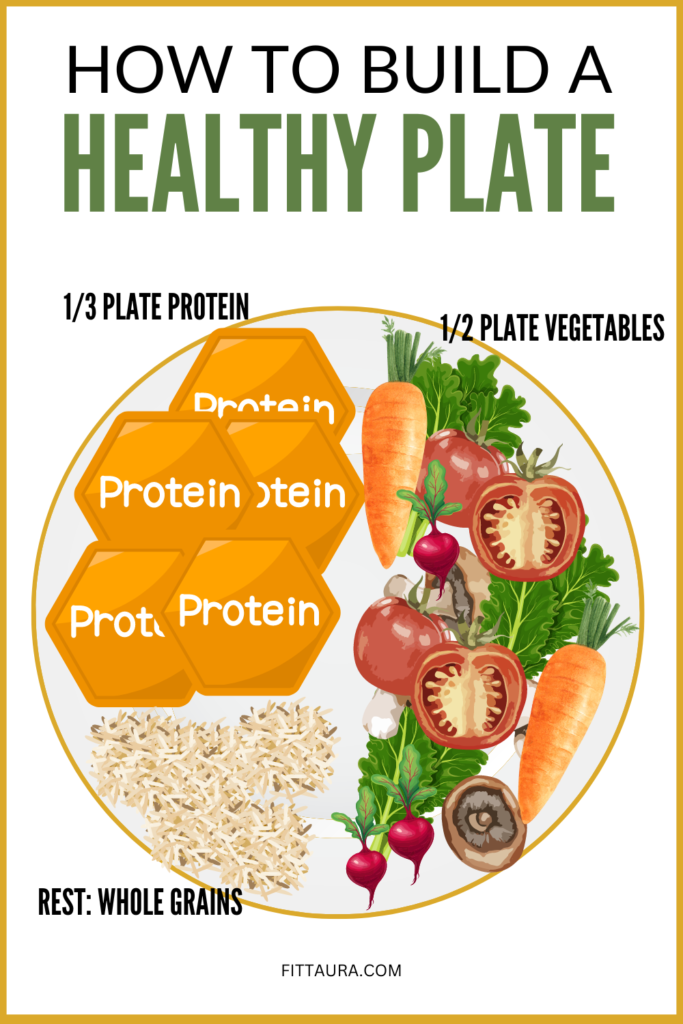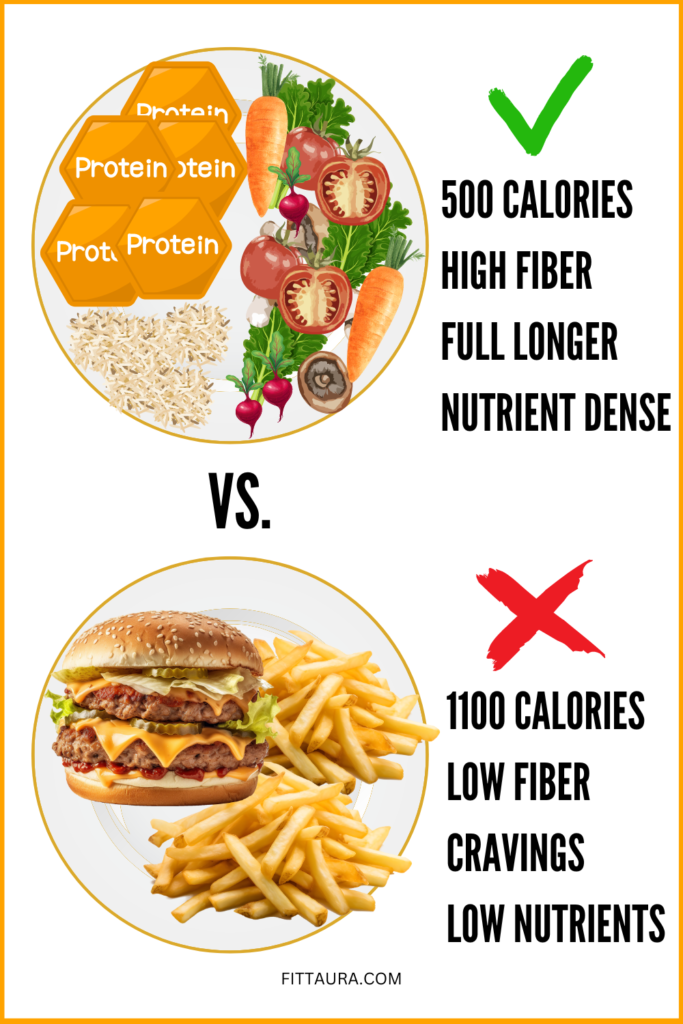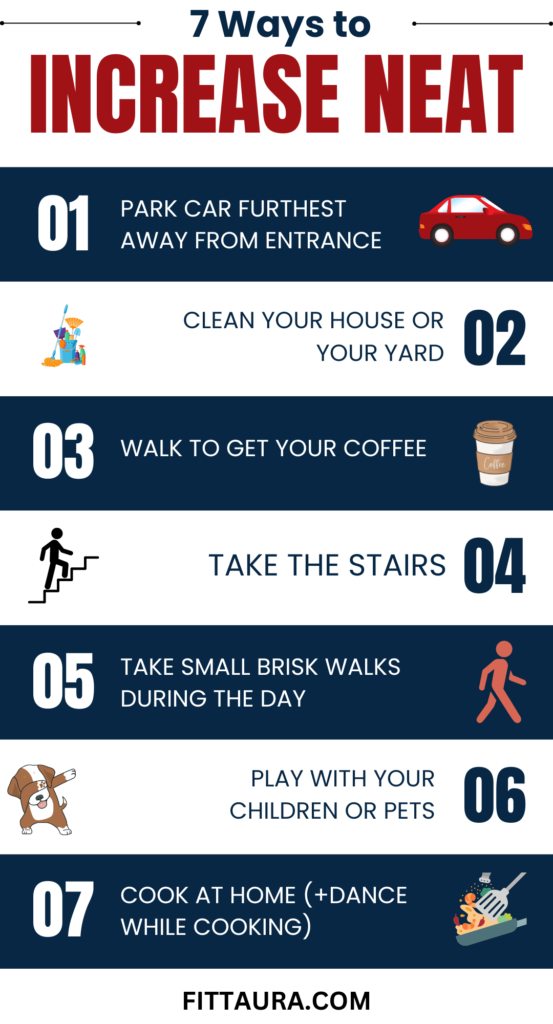Losing weight without counting calories is not only possible but also liberating.
By making gradual, sustainable changes to your habits, you can achieve remarkable results without the need for meticulous calorie counting.
Is it possible to lose weight WITHOUT counting calories?
Yes, it is absolutely possible to lose weight without counting calories. You can reduce caloric intake or increase energy expenditure through habit changes without tracking calories.
To do so, gain a good understanding of your baseline. The steps below offer valuable tips that can either naturally reduce calorie consumption or increase energy expenditure.
Implementing just a few of these tweaks to your lifestyle can help you lose weight on autopilot.
To get started, I suggest being brutally honest with yourself and obtaining a comprehensive overview of which of the steps below you are already incorporating. Then, write down all the potential lifestyle tweaks that could contribute to weight loss without counting calories.
Choose the three easiest changes and practice them for 1-3 weeks. If you observe weight loss, great—keep going. If not, incorporate a few more changes to your challenge.
If you hit a plateau after a while, that is normal. Now, introduce three additional tweaks to your lifestyle to continue progressing. Your body adapts over time, so to keep losing weight, provide your body with new challenges!
However, be cautious! Sometimes, we revert to old habits or fail to consistently follow these tips. Therefore, regularly check yourself to ensure you are adhering to your plan.
When is counting calories necessary?
If your body fat percentage is within the average range, and you want to lose only a small amount while gaining muscle (essentially engaging in recomp training), then counting calories (and also protein) is very helpful in achieving your goal.
When should I not count calories?
If you have or had any eating disorders, I would suggest staying away from counting calories. If this applies to you, please seek the advice of a registered dietitian or your doctor for any lifestyle and nutrition modifications.
If you currently aim to lose a significant amount of fat, or if your fat percentage is above average, it is quite possible to lose weight without counting calories.
10 steps to lose weight without counting calories
The steps below are all ideas you can use to transform unhelpful habits into weight loss (and a healthy lifestyle). Making many small changes over time that you can stick to long-term is the best way to lose weight and maintain your weight loss.
Begin with the three easiest ideas below and practice them for 3 weeks until they become habits. Ensure that you still follow them consistently by the end of week 3, then add more tweaks to your lifestyle to keep losing weight without counting calories.
#1 Use the plate hack
Rearranging your plate to achieve more healthful food group ratios can have a significant impact on caloric reduction without the need to count any calories.
Vegetables, being nutrient-dense foods, contain more nutrients per calorie, adding volume to your plate without significantly increasing calorie intake.
Therefore, it is advisable to fill half of your plate with vegetables (non-starchy).
Next include a protein source, covering about one-third of the plate. Aim for 20-40 g of protein per meal.
The remaining portion of the plate can be dedicated to grains. Opt for whole grains as they provide additional nutrients and fiber.

Modifying your plate composition not only leads to a substantial reduction in calories but also promotes a longer-lasting feeling of fullness, thereby helping to avoid overeating later.
Simply by adjusting your plate, you could potentially reduce daily caloric intake by 500 calories and experience reduced hunger later in the day.
The effectiveness of this approach depends on your current eating habits of course but it is a great strategy for calorie reduction without the need for meticulous counting.

Consider starting with this adjustment three times per week, gradually increasing to a daily practice and beyond.
#2 Cook more at home
Cooking at home can have a huge impact on calorie reduction and your efforts on losing weight without counting calories.
You have more control over portion size and plate ratio. Even if you prepare the same food as takeout, such as burgers and fries, you can air fry the fries instead of deep-frying them, saving some unnecessary calories.
You can also add more vegetables and reduce the amount of fries. You can still enjoy the same meal, just a bit healthier (and cheaper).
#3 Dump liquid calories
Even though completely abstaining from sodas would be ideal, it is an unrealistic goal for many. Simply swapping for zero-calorie soda can have a significant impact on reducing daily calorie intake.
If you don’t like the taste of it, you can work on gradually reducing your intake.
The issue with sodas is that they contribute empty calories to your daily intake, offering no nutritional benefits (besides the momentary satisfaction). These calories won’t keep you feeling full for long and won’t provide any essential nutrients to your body.
A can of coke contains 140 calories. For that same amount, you could consume a yogurt and 1/2 cup of berries, providing protein, fiber, and antioxidants, leaving your body satisfied for a longer period.
There are various approaches to swapping liquid calories. You can replace every other soda with zero-calorie options, switch entirely to zero-calorie alternatives, or gradually decrease soda intake by 10-30% each week.
If you typically purchase sodas to keep at home, consider only consuming sodas when you’re out. This alone can also have a positive impact.
#4 Whole foods for the win
Whole foods are nutrient-dense, meaning they pack a high nutritional punch without being calorie-dense. This allows you to consume a greater volume of food, promoting a feeling of fullness and satisfaction, while still managing your calorie intake.
The abundance of vitamins, minerals, and antioxidants in whole foods also supports overall well-being, ensuring your body receives the essential elements it needs for optimal functioning.
Secondly, whole foods typically have a lower energy density compared to processed foods. This means you can enjoy larger portions of whole foods for the same amount of calories as smaller portions of processed alternatives.
This helps control hunger and reduces the likelihood of overeating, creating a sustainable approach to weight loss.
Moreover, whole foods contribute to a stable blood sugar level. Unlike refined carbohydrates found in many processed foods, the complex carbohydrates in whole foods release energy gradually, preventing sudden spikes and crashes in blood sugar.
This helps regulate appetite, curb cravings, and maintain consistent energy levels throughout the day, supporting a more balanced and controlled eating pattern.
Lastly, whole foods often require more chewing and digestion, promoting a slower eating pace. This slower eating pace allows your body more time to recognize feelings of fullness, reducing the risk of mindless overeating.
#5 Make protein and fiber your BFF
Protein and fiber play crucial roles in promoting satiety and reducing calorie consumption, making them essential components of a balanced and effective dietary strategy.
Firstly, protein is a macronutrient that takes longer to digest than carbohydrates, helping to keep you feeling full for an extended period. By incorporating an adequate amount of protein into your meals (20-40g), you can reduce the likelihood of experiencing hunger shortly after eating, ultimately leading to a decreased overall calorie intake.
Additionally, protein-rich foods often require more energy to digest, contributing to a higher thermic effect, which can further support weight management.
Fiber, another key element in this equation, is the indigestible part of plant foods that adds bulk to your diet without contributing additional calories. High-fiber foods take longer to chew and provide a greater sense of fullness, helping to regulate appetite.
Moreover, fiber aids in slowing down the digestion process, preventing rapid spikes and crashes in blood sugar levels. This steady release of energy promotes a more stable and prolonged feeling of fullness, reducing the likelihood of between-meal snacking and overeating.
#6 Wait before getting seconds
Psychologist Susan Albers explains that there is a delay between eating enough to become full and the brain realizing it, contributing to the difficulty in gauging fullness. This lag is attributed to the time it takes for hormones and insulin levels to rise enough for the brain to detect them. Emotions and social cues also play a role in the fullness process, influencing eating habits.
To address these challenges, Dr. Albers suggests several strategies.
Mindful eating is recommended, encouraging individuals to pay attention to their body’s signals and be aware of approaching fullness. She advises reframing the concept of “full” and replacing it with “satiated,” emphasizing meeting a need rather than occupying every inch of space.
The PAUSE exercise, evaluating hunger levels, and using a hunger/satiety scale are recommended techniques.
Additionally, paying attention to portion sizes, establishing a routine eating schedule, and identifying foods that keep you fuller for longer are suggested approaches. Seeking professional help is advised for those struggling with disordered eating behaviors.
My effective approach involves strategically planning my meals within the range of 500 to 700 calories, a sweet spot that reliably leaves me feeling satisfied. Even though I may not experience fullness immediately after finishing a meal, I’ve learned that if I give it about 20 minutes, that sense of fullness kicks in.
It’s a mindful reminder to trust that the current meal is likely sufficient, and if hunger persists in 1 or 2 hours, I’ll be open to eating more as needed.
#7 Start a food diary (pictures only)
Keeping a food diary is a powerful tool for those embarking on a weight loss journey, providing a structured and insightful approach to understanding eating habits.
Firstly, a food diary brings awareness to what and how much you’re consuming. Recording every meal and snack allows you to visualize your daily food intake, making it easier to identify patterns, areas of improvement, and potential sources of excess calories.
This heightened awareness is crucial for making informed decisions about dietary choices and portion control, setting the stage for sustainable weight loss through losing weight without counting calories.
Moreover, reviewing your food diary regularly allows you to celebrate successes, identify challenges, and adjust your approach accordingly. This self-monitoring aspect not only aids in weight loss but also fosters a deeper understanding of the relationship between your dietary choices and overall well-being.
Setting realistic, achievable goals based on insights gained from your food diary enables you to make gradual, sustainable changes to your eating habits. Whether it’s incorporating more whole foods, managing portion sizes, or addressing specific nutritional needs, a food diary becomes an indispensable ally in the quest for successful and enduring weight loss.
#8 Increase NEAT for losing weight without counting calories
NEAT, or Non-Exercise Activity Thermogenesis, refers to the energy expended during all daily activities that are not structured exercise or sleeping.
This encompasses various movements such as walking, standing, fidgeting, and even activities like gardening or household chores.
While it may not be as intense as a workout session, NEAT plays a significant role in daily calorie expenditure and can contribute to weight management.
One of the key benefits of NEAT is its potential to burn additional calories without the need for formal exercise routines. Incorporating more movement into your daily life can have a substantial impact on calorie burn over time.
Small actions like taking the stairs instead of the elevator, opting for short walks during breaks, or parking your car further away from the entrance can collectively contribute to increased energy expenditure throughout the day.
Unlike structured workouts, NEAT doesn’t necessarily require a designated time slot, making it a flexible and accessible way to burn extra calories.
NEAT’s effectiveness lies in its continuous and cumulative nature. While individual instances of standing or walking may not seem significant, the consistent engagement in these activities throughout the day can lead to a notable increase in overall energy expenditure.
Research suggests that individuals with higher levels of NEAT tend to have better weight management and may find it easier to maintain or lose weight compared to those with lower NEAT levels. This highlights the importance of considering not only structured exercise routines but also the impact of daily movement on overall calorie balance.

#9 Manage sleep and stress
Inadequate sleep can disrupt the body’s hormonal balance, particularly affecting ghrelin and leptin levels.
Ghrelin, the hunger hormone, tends to increase with insufficient sleep, leading to heightened appetite and cravings.
Conversely, leptin, the hormone that signals fullness, decreases, contributing to an impaired sense of satiety. This hormonal imbalance can result in overeating and poor food choices, sabotaging weight loss efforts.
Additionally, chronic stress triggers the release of cortisol, a stress hormone associated with increased abdominal fat storage. Elevated cortisol levels not only promote fat retention but also intensify cravings for sugary and high-calorie foods.
Consequently, managing stress becomes crucial for maintaining a healthy diet and preventing stress-induced overeating. Techniques such as mindfulness, meditation, and relaxation exercises can help mitigate stress and promote better decision-making regarding food choices, contributing to more effective weight management.
Moreover, both sleep and stress influence energy levels and motivation for physical activity. Inadequate sleep can lead to fatigue, reducing the inclination to engage in regular exercise.
On the other hand, chronic stress may result in decreased motivation and increased feelings of lethargy, further hindering one’s commitment to an active lifestyle.
By prioritizing adequate sleep and implementing stress-reduction strategies, individuals can boost weight loss efforts naturally.
#10 Find a workout you love
Finding a workout routine that you genuinely enjoy can significantly impact weight loss efforts, even without following a structured weight loss plan.
Firstly, when you start a workout routine you love, it transforms physical activity from a chore into an enjoyable and sustainable part of your lifestyle. Whether it’s dancing, hiking, cycling, or any other form of exercise that brings you joy, the likelihood of consistency increases.
Regular, enjoyable physical activity not only burns calories but also contributes to an overall healthier and more active lifestyle. This will help in your efforts of losing weight without counting calories.
Moreover, finding a workout you love promotes a positive mindset towards exercise. Instead of viewing it as a means to an end solely for weight loss, you begin to appreciate the intrinsic benefits of movement for your mental and physical well-being.
This shift in perspective can make you more inclined to stay active in the long run, fostering a lasting commitment to a healthier lifestyle. Exercise becomes a source of joy, stress relief, and energy rather than a strict regimen tied solely to weight loss goals.
Lastly, when you engage in a physical activity you genuinely enjoy, it often becomes a social and recreational outlet.
Whether it’s joining a sports team, participating in group classes, or simply walking with a friend, the social aspect of enjoyable exercise adds an extra layer of motivation. Building a community around your chosen activity creates a supportive environment that encourages consistency and helps maintain a healthy weight without the need for a rigid weight loss plan.
In essence, finding a workout you love transforms exercise into a sustainable and fulfilling aspect of your life, contributing to effective weight management over time.




